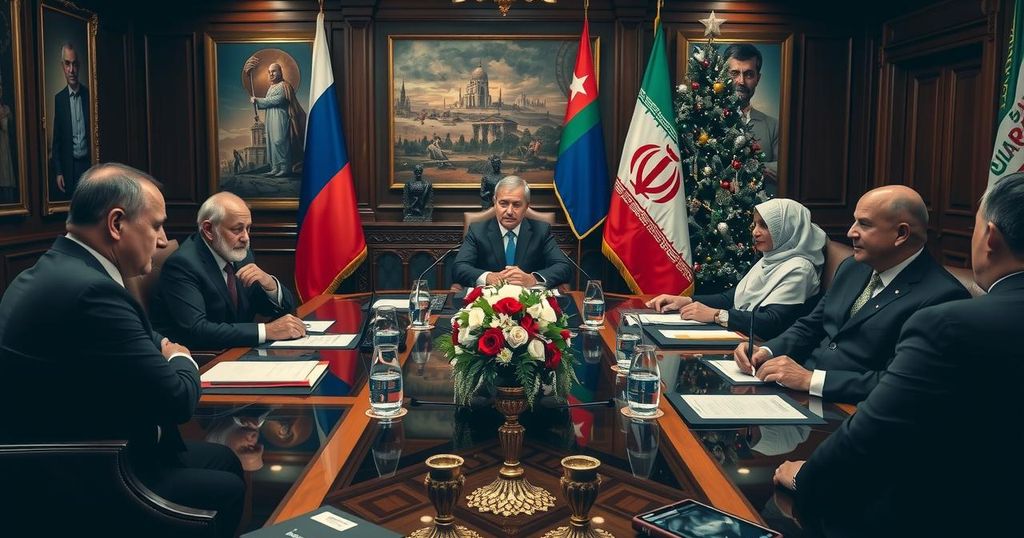Russia’s Recruitment of Yemeni Mercenaries: Implications for Regional Stability and Geopolitical Dynamics
Reports have emerged concerning Russia’s recruitment of Yemeni men through its alliance with the Houthis, who receive financial incentives and military training. This recruitment is part of a broader Russian strategy to mitigate losses in Ukraine while fortifying its influence in the Middle East amidst rising regional tensions. Additionally, potential weapons transfers and intelligence sharing between Russia and the Houthis could further empower the group, posing risks to regional stability and international maritime security.
Recent reports indicate that Russian forces have successfully recruited hundreds of Yemeni men into military service, facilitated by their increasingly cooperative relationship with Yemen’s Houthi rebels. Promised attractive salaries and Russian citizenship, these recruits are reportedly transported to Russia via a Houthi-affiliated company and subsequently compelled to join the Russian army, where they are dispatched to frontline combat. This initiative not only provides financial benefits for the Houthis but also offers military training opportunities for Yemeni recruits under Russian oversight, part of Russia’s broader strategy to utilize foreign recruits to compensate for significant losses on Ukrainian battlefields.
The recruitment of Yemeni fighters represents a facet of a deepening alliance between Russia and the Houthis, which has gained additional importance in the wake of the October 7, 2023, Hamas attack on Israel. Once regarded primarily as an Iranian ally, the Houthis increasingly position themselves within Iran’s “Axis of Resistance,” a coalition opposing Western interests in the Middle East. Recent reports suggest Iran has been negotiating a deal for Russia to supply advanced weaponry, specifically P-800 Oniks anti-ship missiles, to the Houthis. Although such transfers remain unverified, U.S. Special Envoy for Yemen Timothy Lenderking confirmed ongoing discussions between Russia and the Houthis regarding a potential weapons exchange, alongside a ten-million-dollar commitment for small arms shipments that have been rumored for October. Concurrently, Russia has purportedly been supplying the Houthis with critical intelligence to support their operations against shipping activities in the Red Sea.
The strategic value for Moscow in cooperating with the Houthis transcends mere losses in Ukraine. It enables destabilizing activities within the Red Sea, providing Russia with the ability to exert pressure on Western commercial interests and redirect attention and resources toward its military engagement in Ukraine. Moreover, strengthening ties with the Houthis enhances Russia’s leverage over regional actors such as the UAE and Saudi Arabia, both of whom are interested in a resolution to the Yemen conflict. Through this partnership, Russia seeks to reinforce its influence within the region, possibly using these connections to negotiate with the Gulf states regarding their engagement with the United States.
Nevertheless, it is crucial to perceive Russia’s involvement with the Houthis as a pragmatic arrangement rather than a strategic alliance. Moscow likely aspires to back the group as long as its actions do not directly threaten Saudi or Emirati interests. The Russian government maintains diplomatic relations with other Yemen factions, such as the UAE-backed Southern Transitional Council, preserving its options to influence Yemeni dynamics further.
The United States, along with its partners, should closely monitor the developments in the Russia-Houthi alliance due to the significant risks it poses for international shipping and U.S. interests in the region. The Houthis have already demonstrated the capability to disrupt maritime trade severely, contributing to a notable decrease in Suez Canal traffic. Any potential provision of advanced weaponry from Russia could exacerbate this threat significantly, as could enhancements to the Houthis’ domestic military production capabilities, potentially reducing their dependency on Iranian support and allowing for more aggressive operational freedom.
The relationship between Russia and the Yemeni Houthis has evolved significantly, particularly in the context of broader geopolitical shifts in the Middle East. With the ongoing conflict in Ukraine, Russia is actively seeking ways to recruit foreign fighters to address its military needs. Concurrently, the Houthis are solidifying their position as part of Iran’s regional strategy against Western powers. The strategic implications of this alliance are noteworthy, especially considering America’s vested interests in Middle Eastern stability and maritime security.
In summary, the recruitment of Yemeni mercenaries by Russian forces illustrates a complex and evolving relationship with the Houthis, driven by mutual benefits amid shifting geopolitical landscapes. This partnership poses potential challenges to regional stability, particularly concerning maritime security and the influence of international actors such as the United States. With Russian support, the Houthis may strengthen their operational capabilities, complicating ongoing conflicts in the Middle East and necessitating heightened vigilance from U.S. and allied forces.
Original Source: www.atlanticcouncil.org




Post Comment